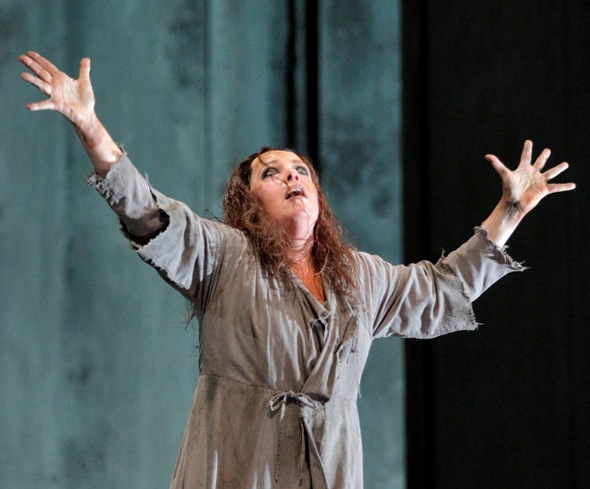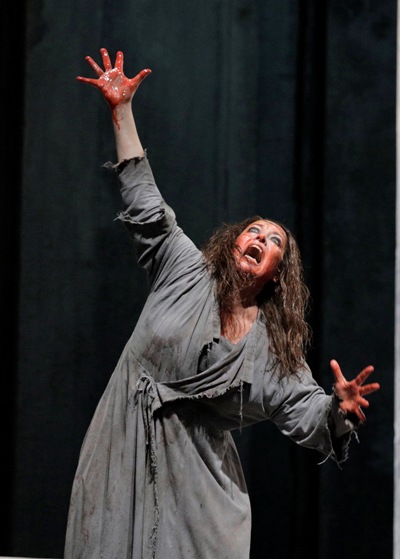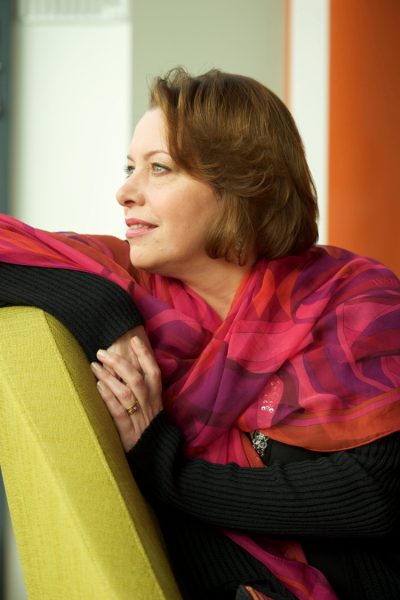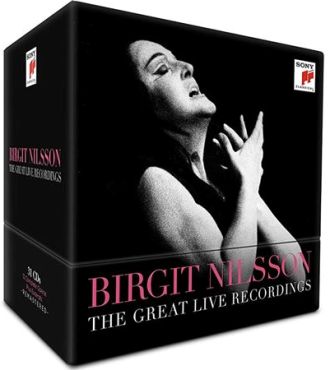Nina Stemme, Lyric’s high-powered Elektra, recalls her cosmic trek from the world of Mimi

Dramatic soprano Nina Stemme is Elektra, a character out of Greek myth, in the Lyric Opera of Chicago production of Strauss’ opera through Feb. 22. She is resolved to have bloody revenge on her father’s killers. (Lyric Opera of Chicago photos by Cory Weaver)
Interview: Superstar soprano, winner of the Birgit Nilsson Prize, says an early competition she lost proved to be an unexpected gift.
By Dennis Polkow
By this point in soprano Nina Stemme’s operatic journey, the high-intensity role of Richard Strauss’ “Elektra” has emerged as a signature piece. Indeed, the Swedish singer and reigning Wagnerian soprano, who currently performs the distraught and vengeful Elektra in her debut with the Lyric Opera of Chicago, all but owns the part. She is the foremost Elektra in the world today, and she embraces the staggeringly difficult role as “the greatest joy” to sing.
“The opera is exciting,” she exclaims, as if tossing aside all the demands. “It’s very intense. It’s short. No intermission. It’s captivating, so impulsive as a piece of work. Elektra is not only dramatic, she’s also very introverted and lyrical and (filled with) all these nuances. And it’s such a privilege to be able to perform here with this orchestra and with Donald Runnicles conducting. (Runnicles is also making his Lyric debut.) We’ve worked a lot together.”
The David McVicar production is new to Stemme, though it has been performed in Chicago before when it premiered at Lyric in 2012.
“But that’s also good, because it means that everything is already prepared in a good way,” she says. “Almost. Things happen in rehearsals.” A knee accident slightly limited her movement on opening night. “Knock wood.”
Lyric general director Anthony Freud says he’d been trying to lure Stemme to Chicago from Day One of his appointment here in 2011.
“She and I go back a long way and she is an artist I have admired for decades,” says Freud. “I actually first heard her when she was a finalist in the BBC Cardiff Singer of the World Competition. I’m not sure any of us in the audience that day would have thought that one day she would move into the repertoire that she has specialized in, the dramatic soprano German repertoire.”
“It is true,” the Swedish superstar soprano admits, settling in comfortably in a backstage Lyric Opera office, clutching a steaming coffee mug and elegantly dressed in brown suede and scarf with high fur-fringed boots suitable for a Chicago – or a Stockholm – subzero day. “I was a big lyric soprano at that time. That was 1993. I sang Mimi and Debussy [at Cardiff].”
The proof can be heard on YouTube, where it is clear Stemme had a radiant voice for that repertoire. So why the shift from lyric soprano to dramatic soprano?
“It really wasn’t a shift, but a journey,” she explains. “I got offered to sing ‘Madama Butterfly’ quite early and as soon as people could hear that I had conquered that role at all, they started to ask me about things like Isolde. But that was far too early. I actually thank everyone on the board of the Cardiff Singer of the World who did not let me win!” She is serious: “This was absolutely the right thing for me. It gave me time to develop.”
Twenty-five years later, Stemme made headlines in May 2018 when it was announced that she was the Birgit Nilsson Centennial recipient of the million-dollar Birgit Nilsson Prize, named after the great Swedish Wagnerian soprano of the mid-20th century. In winning, Stemme joins a very select group that includes tenor Plácido Domingo (2009) – chosen as the first recipient by Nilsson herself before her death in 2005 – conductor and Chicago Symphony Orchestra music director Riccardo Muti (2011), and the Vienna Philharmonic (2014). Stemme is only the second singer to win the Nilsson Prize thus far.
“Of course, when I found about it, it was over a year before the actual ceremony,” Stemme recalls. “So, I had to keep it to myself and my family, and I could hardly believe it. I almost didn’t want to believe it because I thought: Wow! I hear about writers receiving the Nobel Prize in Literature who then stop writing. What if I stop singing? So, I had a little crisis, I’ll tell you. I don’t think anyone found out about it except my closest family, but I was thinking about it every single day. It’s such a big thing and I had not at all counted on it. It’s just little me.”
The symbolism is powerful that in the year of the Birgit Nilsson Centennial, it was Stemme, another Swedish soprano doing Nilsson’s repertoire, who was chosen. Stemme is fully aware of the weight of this comparison. “I’m a product of my generation of operagoers and opera singers, so we are different. And I want, of course, my profile, my personality to come through. But as Mahler said, ‘My time will come’‒ I am more than happy to give tribute to Birgit Nilsson because I am so happy that her memory is still alive, her art.”
Indeed, there is no shortage of media available on Nilsson, particularly since last year’s centennial. There is a newly released 90-minute documentary “Birgit Nilsson: In a League of Our Own” that includes archival performance footage and interviews as well as new appreciations, including from Stemme herself. The massive 712-page “Birgit Nilsson – A Homage” includes reviews, essays and performance photos across Nilsson’s nearly 40-year career. And a 31-CD set, “Birgit Nilsson: The Great Live Recordings” on Sony Classical, includes never-before-released live recordings of performances also spanning Nilsson’s career.
That set is particularly illuminating for those who, like Stemme, never had a chance to hear Nilsson perform live. Unlike commercial recordings which tended to place microphones too close to Nilsson, the more distant recorded sound is far truer to what Nilsson sounded like in opera houses. Says Stemme, “I am always so surprised how youthful her voice sounded and how beautiful, especially at her prime.”

Birgit Nilsson hugs Stemme in 1996. They were in touch throughout the younger singer’s early career. (Birgit Nilsson Foundation photo)
Stemme is often called a protégé of Nilsson, but their relationship was more complicated than that label might suggest. “She looked at me as a colleague rather than as her being a mentor,” says Stemme, “although I could use her as a mentor if I had any questions. She was always very open, very generous. I think she knew intuitively that every singer has to do it his or her own way. Sometimes when I exposed a weakness, I would say, ‘Oh, I think it’s very difficult to hold a steady piano tone.’ And she would say ‘Well,’ (in a wicked mimic of Nilsson’s speaking voice) ‘maybe it could be the support.’”
Stemme’s early musical journey was hardly conventional. She and her two sisters were each taught the piano and an ensemble instrument. “First, the violin for me,” she recalls, “but then the viola when I was big enough, because I liked the mellow sound of that. And I played quite a bit until I realized that maybe this is not it – for me, anyway. So, I cancelled my audition to the Conservatory in Stockholm on the very day of the audition.”
The young Stemme did sing in choruses. During a year as a high school foreign-exchange student, which brought her to Virginia, she took some voice lessons because she got a sore throat every time she sang. “I tried to keep the voice to myself because I was scared to death it would be heard,” she says. “I thought I had a pretty ugly voice. And then I realized, ‘Hm, it shouldn’t hurt this much.’ So I took voice lessons and then I realized that you just don’t ‘take’ voice lessons like that, because it has to be the right person. I wasn’t really interested in singing solo. I just wanted to fix my instrument.”
When Stemme went home to Sweden from America, she did take voice lessons, “but just for fun, still. I was singing songs, lieder a little bit, more like singer-songwriter songs and accompanied by a guitar. Actually, at one of those concerts in a small museum, I performed a few songs to poems by Swedish poets and a very special atmosphere was created in this little hall. And I thought, ‘Hm, this is interesting. I can really tell a story. I can really convey how important I feel these songs and these poems are.’ That started me a little bit more focused. Singing became a hobby, but it became more and more serious. And I sang in churches to earn some pocket money during that time.”
Stemme eventually got into the school now known as the Stockholm Opera Studio. “We had some acting classes and you had to have your private voice teacher, so we did like little scenes of operas,” she says. “My vocal coach later had me listen to a lot of Wagnerian singers: Astrid Varnay, Birgit Nilsson, of course, Marjorie Lawrence, Tiana Lemnitz – old recordings where the sound wasn’t perfect, but after a while you learned how to listen. It was totally different from anything I had heard live so far. I could hear much more soul in those voices.
“So I think that’s what drew me more and more towards Wagner. But I knew, as we say in Sweden, to dig in where I stand and sing the repertoire that was the best-fitted for my voice. At that time, it was Mozart and Puccini. I must say I really enjoyed the few Mozart roles I sang, and even more, the Puccini repertoire that I later got to sing in the opera house at Cologne.”

Stemme, seen here as Lyric Opera’s murderously angry Elektra, was drawn gradually into opera’s great tragic roles.
But even back then, when warming up to perform Mozart, Stemme admits she would have a bit of fun vocalizing as Sieglinde in “Die Walküre” – “especially the third act. And sometimes, at school parties, after a couple of beers – excuse me – I got to sing the narration of Sieglinde from the first act.” Those were times that Stemme felt she could let go and take care of her needs for that repertoire, “without judgment,” and “in a fun way.”
Stemme expected to pivot into Wagner with the role of Senta in “The Flying Dutchman,” which she sang in Belgium in Antwerp und Ghent. But it wasn’t easy for her, and she wrote to Nilsson that she thought she had reached her limit. Meanwhile, Stemme had already received an offer from the Glyndebourne Festival to sing in their first-ever staged Wagner opera, with Stemme as her first-ever Isolde. “And I thought, ‘Hey, you must be kidding! This cannot be true because I can barely sing Senta.’ Then I found out that [they were serious.”
Somehow Nilsson had found out, too, according to Stemme: “She said, ‘Oh, I don’t think you’ve reached your limit with Senta at all. And I hear, by the way, that maybe you will sing Isolde at Glyndebourne.’ In hindsight, I can feel rather proud of myself because I stopped, I counted to ten, and said, ‘What would I need in order to sing my first Isolde?’
“So I took it to my coach and we sang it through, and he said, ‘Actually, I think you can do this, and in your way.’ It took me two-and-a-half years to learn the role. And that is the best investment I have ever made.”
Does Stemme have any special insight regarding what it is about Sweden that produces these iconic dramatic sopranos such as Nilsson and herself?
“I don’t know. I mean I do get this question quite often. We are quite grounded and you can’t be too neurotic outside or even inside to do this. We are used to working hard and taking things by quite small steps in order to improve. The language helps – clear vowels and also for the German repertoire, it’s easier, maybe, for us. And we are also used to learning a new language because Swedish is such a small language. Only 10 million of us speak it, so we’re open minded, in that sense.
“But if I had come up with the answer, with the formula, I would probably have kept that to myself and started an opera school right away, and stopped singing!”
[Dennis Polkow’s interview with Nina Stemme – engineered by Eric Arunas and produced by Steve Robinson for New Media Productions – is available for listening in its entirety below. Award-winning journalist Dennis Polkow is a critic, author, broadcaster and educator. He has been covering Chicago-based cultural institutions for national and international media for more than 35 years.]
Related Link:
- Nina Stemme triumphs in Lyric’s ‘Elektra’ as vengeful princess with a ready ax: Review at Chicago On the Aisle





1 Pingbacks »